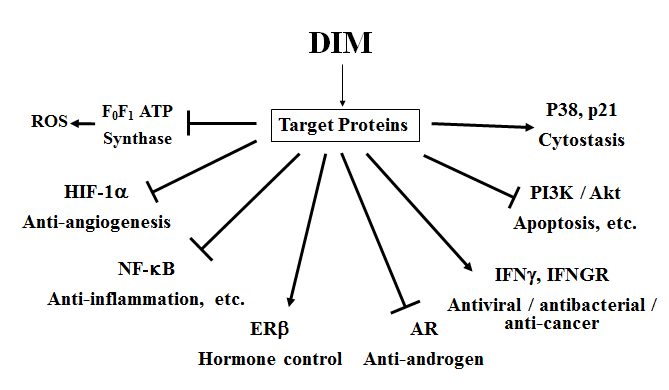Consuming cruciferous vegetables causes your body to develop a substance called Diindolylmethane (DIM). It is also concentrated and available as a supplement. DIM, which regulates estrogen levels, may aid in the treatment of a variety of diseases, including hormone-sensitive diseases and prostate issues.
Some Potential Benefits
● It can fight acne. Diindolylmethane supplements may be used to treat hormonal acne. However, there are currently no studies supporting this use.
● May reduce hot flashes. Menopausal hot flashes may be due to hormonal changes. DIM diindolylmethane supplements have been used to reduce hot flashes, but their effectiveness has not been supported by research. It is believed that monthly variations in estrogen levels cause PMS symptoms. Again, some patients take DIM supplements to reduce their symptoms, but research has not supported this.
● It can correct estrogen imbalances in men. Men with high estrogen levels are more likely to have infertility, breast development, and erectile difficulties. Although DIM supplements have not been examined in humans, they may be useful.
Research is required, particularly for applications involving PMS symptoms, acne, and weight reduction that aren’t currently supported by human studies. Therefore, consult a healthcare professional before taking Diindolylmethane supplements. Eating more cruciferous veggies is always a good idea, regardless of how effective DIM is. After all, plants like broccoli and kale are sources of critical nutrients including fiber, antioxidants, vitamins, and minerals.
The Recommended Intake
There hasn’t been enough research to determine the appropriate Diindolylmethane (DIM) dosages. Human studies, however, mostly focused on diseases and prostate enlargement therapy, and have employed doses that typically range from 108 to 900 mg per day.
A study of 24 healthy individuals found that one person experienced nausea, headaches, and vomiting after taking a 300-mg dose of DIM, indicating that higher doses may be associated with unfavorable side effects, despite the fact that DIM levels up to 200 mg were well tolerated and did not cause side effects.
Human trials on further uses for DIM diindolylmethane supplements, such as weight loss and acne treatment, are lacking. As a result, it is important to speak with your healthcare provider to get dosage guidance that is specific to your intended use.
Risk Factors and precautions
Little is known about the long-term safety and side effects of diindolylmethane supplements due to the lack of human studies. Current human studies have not shown DIM supplements to be toxic or have significant side effects. The most common side effects include dark urine, increased bowel movements, headache, and bloating.
Less common side effects are nausea, vomiting, diarrhea, and rash. Diindolylmethane (DIM) supplements interact with estrogen levels and may affect hormone-sensitive diseases and people on hormone therapy. Such individuals should stay away from DIM supplements unless under medical supervision.
Regardless of your medical history, it is important to consult your doctor before taking these dietary supplements. DIM supplements have not been shown to cause serious side effects, but more safety studies are needed. Those taking hormone therapy or suffering from certain hormone-related diseases should avoid these supplements. To know more, visit- https://www.diindolylmethane-dim.com/


